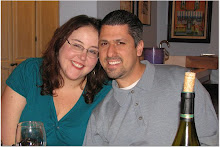First of all, I need to apologize profusely for not blogging as much as I should have been over Passover. Two Yom Tov days, one Shabbat and then another two Yom Tov days makes my schedule for blogging a little bit tumultuous.
But on Shabbat, as I observed the Yartzeit/Anio (read: anniversary of death) for my beloved grandmother, the guest rabbi at the temple made a sermon about – what else? – Passover. But it was also about the hectic nature around the holiday.
“It seems like everyone gets crazy around Passover,” he said. Let’s just say he’s not kidding. What with the cleaning and the spending of hundreds of dollars and hours to get everything just perfect, whether it’s groceries or cleaning, Passover has become more of a hassle. In fact, I heard a woman nearby whisper “cleaning,” with a tone of stress and tiredness in her voice. (It seems like this is the time of year is where women suffer more. I joke around with Ari, as he says that Passover is his favorite holiday, and I say, “You don’t have to do most of the cleaning and preparing. That’s why it’s your favorite holiday!”)
And as though the rabbi read my mind, he asked, “But where is the joy?” He explained that Passover was supposed to be eight days worth of simcha and celebration.
What he asked was something I wondered myself through all the struggle of not eating chametz, the cleaning and kashering and what seemed to be piles and piles worth of dishes in the sink, made to look even bigger by the bins that I put in there to prevent the dishes from touching the sides. Meanwhile, I’m cooking and preparing every meal and trying to make do with the horrible Passover ingredients that I have been allotted for the holiday.
I wonder why Passover has to be so hard. We are supposed to celebrate our exodus from Egypt, and we are made slaves to the insane demands that this holiday requires – not to mention the horrible foods.
As we exit the holiday, we need to think about this for the next year. It’s something worth thinking about. Particularly for a holiday about freedom, we should never become slaves to the particulars. I know I am going to make a lot of people who follow every rabbinical teaching absolutely nuts with this one, but can we not be so paranoid when it comes to Passover? I would rather have kitniyot in my house rather than drive everyone in my life up a wall. I would rather look forward to this holiday with some joy instead of having it bring fear into my heart.
And speaking of kitniyot, it’s something worth thinking about. If you study the laws of kitniyot, the only reason why it happened was because the rabbis noted that wheat was being ground up with beans and rice (corn wasn’t really a factor in Eastern Europe, as it’s native to the Western Hemisphere), so they outlawed them altogether. But with the world changing as it is and the way the food is processed, there are many people who are bringing kitniyot back into their diets – particularly vegetarians and vegans, who need good sources of protein during the holiday.
As Israeli rabbis are fighting the issue out for Ashkenazim in Israel (here’s a great article about it from YNet, and here's another great one from The Forward), it’s something I am also considering for next year. I found out from my mother that my family, as Sephardim, eats certain types of beans and legumes for Passover (we always ate peanut butter on matzah, and also ate green beans happily on the holiday). I’ve talked to Ari about it, and it’s something we’re definitely thinking about doing next year.
Either way, we’ve got to rethink this holiday. It shouldn’t be reduced in joy because certain members of the family are slaves to their kitchens or the high price of Passover foods. Perhaps if we find a way to relax about this holiday, whether it’s being not as crazy when it comes to kitniyot or whether we buy our kosher for Passover products at not-kosher-for-Passover stores, we need to figure out how we can really say, “Let my people go!” – and actually mean it.

No comments:
Post a Comment